

 © Copyright 2012 Rock Interviews dot com, Photos :
Rock-Interviews.com.
© Copyright 2012 Rock Interviews dot com, Photos :
Rock-Interviews.com.


 © Copyright 2012 Rock Interviews dot com, Photos :
Rock-Interviews.com.
© Copyright 2012 Rock Interviews dot com, Photos :
Rock-Interviews.com.


Interview - The Fleshtones
Monday 12th March 2012
Villeurbanne - (France)
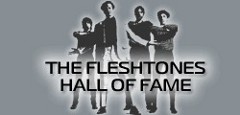
|

|

|

Keith : I would say a must!
Peter : Yeah, I think the most exciting band in rock'n'roll today.
AM : Why do you choose this name for your band?
Peter : That's an old story.
Keith : Peter had to go to SVA (School of Visual Arts) to come up with the name.
Peter : There we go.
Keith : He took the course in rock'n'roll band names.
Peter : We were painting students and it seems like a funny name.
But the name happened way before the band.
Bill is entering the room and takes a sit.
Peter : They caught him running down the street away from the Transbordeur!
Keith : Before we continue, Bill has to introduce himself.
Bill : OK, I'm Bill Milhizer, The Fleshtones, the Drums, la batterie. I got that right, thank you!
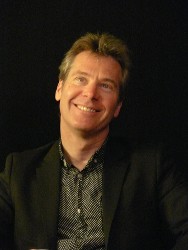
Peter : Popular radio of the 50's and 60's, the stuff we grew up with.
Keith : When I grew up in New York City and the radios were actually very
nice to listen to, so things like Motown, The Beatles, The Rolling Stones,
this was all on the radio, and The Doors and it was all good.
Peter : Yeah the radio. Later on we became more like, you know, not scholars
of rock'n'roll, but you know, fans listening, but basically things we heard on the radio.
Keith : I can remember that
Mitch Ryder
was a hit record, Devil With The Blue Dress.
Peter : Not bad, Mitch Ryder.
Keith : You know, you can just turn the radio on and that would be on.
Peter : Mitch Ryder was on the radio the same time, they're playing The Animals,
San Franciscan Nights and a bunch of other things, there was always something good.
I have to say that in 1968 I switched from the AM radio to the FM radio,
because they were playing more like
The Yardbirds
and
The Kinks, Fever Tree,
and all this crazy music,
Jimi Hendrix, Love, all this wonderful stuff,
so I started being very...
Keith : Yeah you went underground.
Peter : Yes underground, under the covers, I should say. I would pretend to be sick so I didn't have to go to school and instead stay home and listen to the radio, was that good?
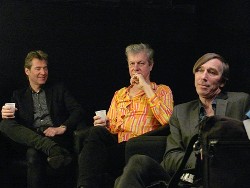
Ken : Supper rock.
Keith : Not supper rock.
Ken : So what is it?
Peter, Keith : Super rock, yeah!
Bill : It's an exaggeration of great rock but exaggerated with no apologies what so ever.
Peter : That's right.
Bill : I said that twenty-five years ago, I said it again today.
Peter : Without trying to be you know proper or anything, we just combined all the
stuff we like, we are not purist of any sort, so we can have fun with the music.
AM : You also invented something, a cocktail.
Keith : Oh, a cocktail, if you want to call it like that, you mean the
Blue Whale, I think.
Peter : We've popularised it, but not invented.
Keith : I didn't invent it, I'm not that good, but I certainly made enough of it
to become proficient. When you needed a batch of Blue Whale at a party, I was the guy.
I can make gallons, I can make garbage pails full.
 Peter : I have to say, in the late 60's, there was a very famous, called the Groundbreaking
Play on Broadway that became a movie called The Boys in the Band, which was dealing with
the subject of homosexuality and they mentioned the Blue Whale very often in this play.
Peter : I have to say, in the late 60's, there was a very famous, called the Groundbreaking
Play on Broadway that became a movie called The Boys in the Band, which was dealing with
the subject of homosexuality and they mentioned the Blue Whale very often in this play.
Bill : As a drink?
Peter : Yeah. They had a big party and they were drinking Blue Whales.
Bill : Oh my God, I saw the movie but way back.
Peter : They may have changed it to something more commercial for the movie and they're
talking about the Blue Whale. Now, Keith is going to tell you the formula to make
a good Blue Whale.
Keith : The formula is basically, two to one, is your guideline meaning, two parts of Vodka,
two one part blue Curaçao and basically two parts of lemonade to the two parts already
to one of Vodka and Curaçao and plenty of ice that you mix.
Peter : You put it in a big like a trash can, enough for everybody!
Keith : Trash can is big but if you can get a vessel that can contain the Blue Whale that
is clear, like glass, then you can see the colour. I can do that in small quantities.
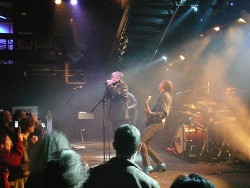
Peter : Easily. OK, there are some bands that have a lot of energy but I
think when it comes to wackyness and energy and non stop fun, The Fleshtones
are known throughout. It's easy, other bands just sit around and look at their shoes,
whatever they're doing.
Keith : The majority do, there is only that 3%...
Peter : You're thinking I'm exaggerating.
Ken : No.
Peter : Who do you think is better than us on stage?
Ken : Oh Jan and Dean. (all smiling and laughing). I think they're both dead.
Peter : Anyway, I want to go back to the subject of the Blue Whale because
drinking is fun. When was the last Blue Whale party?
Keith : Probably in the mid-west.
Peter : Where was it?
Keith : Where was it?
Peter : Mancato, Minnesota.
Keith : They made Blue Whale available to the public for free.
Peter : I think you could buy them.
Keith : Oh they were for sale, anyway.
Peter : What a mess!
Keith : It turned into a mess. And I don't mean just the carpet, I mean people's brains!
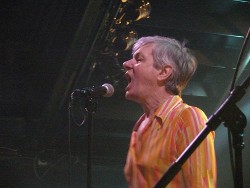
Bill : Food, food and food.
Keith : Wine and wine and I love fromage in France.
Peter : I like the people. The audience is different, but they are really good,
you know the type of support we get in France, it warms my heart,
we can come and play in Paris, everyone has a reputation here of being
not very nice, even in France people say oh Paris bla bla...But they've
opened their hearts to us, so that was very special. This shirt was almost
destroyed in Paris by two young girls who tried to rip it off my back as
I was singing and luckily I rescued it, cause it's a nice shirt!
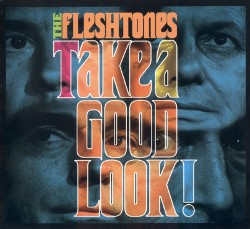
All of them : There it is.
Peter : Hold that up, so people can see what we've done.
Keith : Take a good look.
Peter : Take a good look baby.
AM : And in 2011 you released a new album called "Brooklyn Sound Solution"
on Yep Rock Records. Why this title ?
Peter : That was your idea Keith, you'd better explain it.
Keith : Because the majority of us live in Brooklyn, and I don't know,
Brooklyn is a kind of happening place to be at the moment, and there's
lot of new fresh ideas and creativity coming out of Brooklyn, especially
in the Williamsburg area where I live. So I think it was kind of a good start
for an album title and the sound solution I figured like the world needs here
again a new sound solution, and since we probably came up with the idea of
super rock I figured, yet again, there's something like another solution is
necessary, so it ends Brooklyn Sound Solution.
Peter : I happened to like that, I think it was very good.
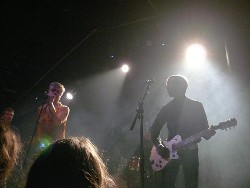
All of them : Yes.
Peter : And still is.
Keith : He is very busy with Patti now.
Peter : And also some of the inventor of the Nuggets like garage rock aesthetic a bit.
Keith : I guess he was the first ever to compile any garage music.
Peter : He did, he was the first.
Keith : He was the first of even thought of garage music.
Peter : That's what they call then america's first era of Punk Rock, the 60's
and he was the guy who's kind of invented that before he was even with Patti.
And he wanted to record with us for a long time. So we finally got together and
it was a lot of fun. I was just thinking that there is one track that is still
not finished from there, the Guitar Boogie.
Keith : Yes there is The Guitar Boogie Shuffle, there's one in the can!
Peter : There is one left that hasn't been done.
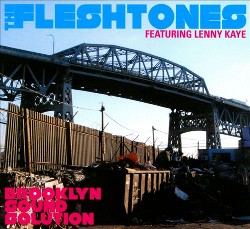
Keith : Eleven.
Peter : Eleven or Twelve? I think it's twelve.
Ken : I've never counted them.
Peter : If you count Lost On Xandu, which we didn't!
AM : It's made up mostly of cover songs.
Keith : Yes, the majority is.
Peter : It's a funny record.
Keith : How many originals on there, four, five?
Peter : There's a couple of originals. At first we're gonna say only covers.
Keith : Then there was supposed to be instrumentals.
Peter : Only instrumentals.
Keith : But then I thought like now, we should make at least...
Peter : And then they were saying, let's do your soul music, but it would rather
be a combination of all those things.
Keith : So that's kind of them.
Peter : Nice listen album.

Peter : Is there a prize?
AM : Why not! Please take one of these.
Keith : Each? Well okay.
AM : Please tell me what is written on this piece of paper and explain it.
Peter : Okay let's go. Do you want to go first?
Keith : Yes. Comin'Home Baby. Opening track. So I'm brought down into the studio and introduced
by Lenny Kaye, always wanted to do an instrumental version, so that's what he claimed,
but him, as lead guitar player. I think originally was Mel Tormé's song.
Peter : But this is actually the second time we've recorded this song.
Keith : That's right. We did it years ago, vocal version, a sort of like Mel Tormé's
version, except The Fleshtones take on it. So that's really the second time for us Coming Home,
so it's appropriate timing.
Peter : Back Beat. Okay Back Beat number one. It was an instrumental that we recorded for
the album. Again Lenny wanted to record this record and we provided the Back Beat thing
to do it. I have to say I don't remember who did this song originally, but it's become a
very important part of our show.
Ken : Ah, I've the infamous Lost On Xandu.
Peter : the controversial. (all laughing)
Keith : Have you ever been controversial? I don't know if you should go there.
Ken : I haven't anything to say about this.
Bill : Do you mind if I do this one and you'll do this?
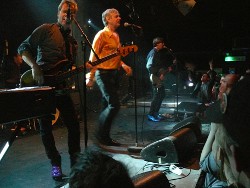 Ken : No.
Ken : No.
Peter : Lenny contributed that song to the record. And we have to say that it was very
hot on there.
Ken : It took as long as the previous track.
Pete : It took as long as all the other tracks combined.
Ken : Yes and if you ask, if Lenny was sitting here and he picked this, then he will
probably say, I destroyed that song. I would just get rid of this right now.
Peter : And there we go.
Bill : Alright, what might it be, oh I wish You Would. We put a bass and over beat
to that classic Yardbirds song, just to change it around and have fun with it in that way,
and that too was kind of like a big part of our set, because it's just changes things
dramatically when all of a sudden The Fleshtones are playing bossa nova music, but it's a R&B too.
Keith : It's a
Billy Boy Arnold
song.
Peter : Originally.
Bill : That's right.
Peter : But The Yardbirds popularised it with two great versions, then there is our great version!
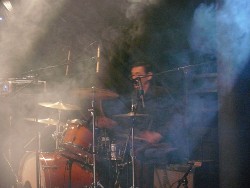
Bill : We go around the other way, okay I just take this one, whatever it might be,
I've got one, you've got one.
Peter : Who wants to begin, Keith you must go first again.
Keith : Alright. Solution One and two. Well since the album is called the Brooklyn
Sound Solution, obviously there are some solutions for people to listen to.
I think Peter wrote two, these are the original songs on the record by the way.
Peter : I don't know, you wrote one.
Keith : I think, I forget, anyway.
Peter : We always want to do a song to this what could that be, the twine.
Keith : And that might be Solution one. Actually that is Solution one and Solution
two was a song by Peter, was supposed to be the closing song on the record.
Peter : It was especially done for that.
Keith : Anyway those are solutions for people, you put that on.
Peter : Musical solutions, non-violent solutions.
Peter : Rats in My Kitchen. An old song by
Sleepy John Estes, that we always wanted to do.
We used to do it, we used to improvise and do bits of it in our live show and finally
we said, let's just do this recorded for a good version, and we do it more or less like
The Kinks maybe would have played, Rats in my Kitchen.
Ken : I have Day Tripper, a Beatles song obviously. This was brought in by Phreddie Patterson,
an old friend of the band, I guess kind of works as a producer on this record.
Peter : Yes.
Ken : He was kind of the glue between The Fleshtones and Lenny. He brought in a lot of the
hits and some of the ideas for the material, he brought this in, we have not changed it a
lot from the version and I forget, the instrumental.
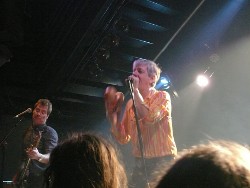
Peter :
Lee Moses.
Ken : Lee Moses, so we actually have not changed it from Lee Moses's version all that much,
that's what I think for
Phast Phreddie Patterson
contribution to the sessions.
Bill : Alright. Bite Of My Soul. We said there are some originals on Brooklyn Sound Solution,
and this is the premiere originals, that's a Peter Zaramba's song and it's like a rock and
soul thing, so we lay down this funky beat for caucasian fellows can and I think it's a
pretty great song.
Keith : There's two more.
AM : Yeah, so who wants to do them?
Peter : I take one. You Give Me Nothing To Go On, two versions. I think Phreddie brought
that song in and that would be good for you, and at first we're thinking we just do an
instrumental maybe, but then we started to say there should be some vocals on the record
as well, so we said why not do an instrumental version and why not do the vocal version,
and I love them both. Again what we've done is combined the instrumental and the vocal
version, and it's part of our show now.
Ken : I've got I Can't Hide, which Keith sings on the record, which I guess it's kind of
whose that genre that came out of rock steady. We learnt later there's been some other
versions for this, going into this record we hadn't heard any of them, just been the original.
Keith : It's
Ken Parker.
Peter : And then
The Specials
I think might have done it, but our version is much better,
quite frankly!
Bill : It's faster, I can tell you that!
Ken : It's faster on stage I can tell you that! Keith does a great job, a great singing
on this song.
Peter : It's an old Jamaican song.
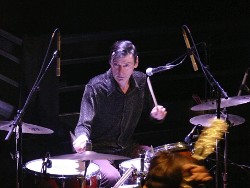
Keith : Pardon Us For Living But The Graveyard Is Full.
AM : It's a one-hour image archives, is that right?
Peter : Even more, it's a feature film.
AM : Interviews of all the members of the band.
Peter : It's a very good movie. The one thing I know he had a little trouble
getting some what we call archival footage from some of our great appearances
and we would find maybe a little more of that, but that said it's a great movie.
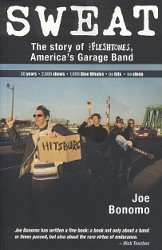
Peter : He wrote the book Sweat.
Bill : A good friend of ours from Chicago.
Peter : No DeKalb. I'm from now on, I am not going to let him push you off this
Chicago thing anymore, he is from DeKalb.
Keith : Here's Sweat.
AM : Joe wrote a biography of The Feshtones called Sweat,
the Story of The Fleshtones published by
Continuum Books
in 2007 and
a French version will be released very soon.
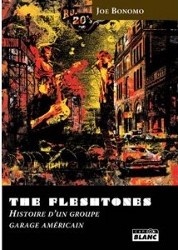 Peter : About time. The French edition is coming out on the 15th of March and
I highly recommend it.
Peter : About time. The French edition is coming out on the 15th of March and
I highly recommend it.
AM : By
Camion Blanc
and you will maybe have it at your gig in Bordeaux.
Peter : I hope so.
Keith : Really? That will be nice.
Bill : It would be exciting.
AM : Sorry I don't have the edition here because.
Peter : Not existing yet!
AM : It's just been printed.
Bill : It's like trying to get new wine a week before Beaujolais Nouveau day.
Everyone is waiting, this is the biggest, the Beaujolais Nouveau release!

Bill : We don't know, we are not ready yet.
Peter : We do have to begin that soon.
Bill : They change every night, we really don't play the same things. Some bands literally,
they go out on tour with a whole box of copies, it's the same show every night,
we get out our magic markers and write them and then go on stage and play.
AM : Good. As you have survived disco, punk, new wave, and all other kinds of music,
what do you think you will survive next?
Keith : Ourselves.
Peter : That's hard to say.
Bill : I mean obviously, when we were playing first start, we were recording on vinyl and
put it out final singles, and asking an owner to put it on the juke box, and hustling like
that. Now it's all obviously internet and things like that, so I think thus far we are
fairing very well there you know.
Peter : I think we're going to survive the CD, that we will outlive the CD format of music,
that's my prediction.
AM : That's it! We wish that you will have fun tonight on stage.
All of them : Thanks.
Keith : We should be.
Peter : We will. We appreciate you talking to us.
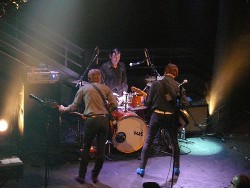 Bill : Two years in a row now! And we really appreciate you very much, and make it
three years in a row!
Bill : Two years in a row now! And we really appreciate you very much, and make it
three years in a row!
Peter : Love to see you again next year and enjoy the show.
AM : Of course, we will!
Peter : This is why we're here actually you know. It's one thing for us to explain these
things, but the real reason is that we are here to play and for people to enjoy it,
so enjoy the show!
AM : Thank you very much for your time guys, we wish you all the best for the future.
All of them : Thank you, merci beaucoup !
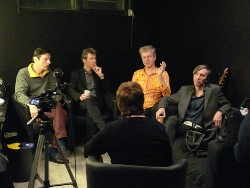

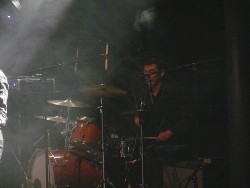
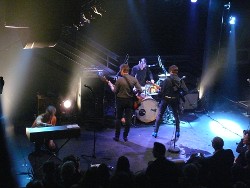

|

|